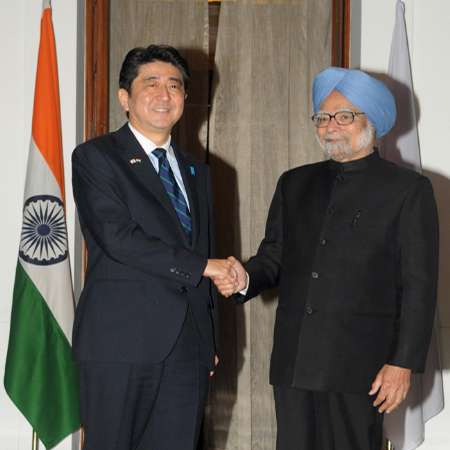ID :
315072
Sun, 01/26/2014 - 09:59
Auther :
Shortlink :
https://oananews.org//node/315072
The shortlink copeid
India, Japan Reaffirm Commitment To Elimination Of N-weapons

New Delhi, Jan 26, IRNA – India and Japan on Saturday reaffirmed their shared commitment to the total elimination of nuclear weapons.
A Joint Statement, issued after the comprehensive summit meeting between the visiting Japanese Prime Minister Shinzo Abe and his Indian counterpart Manmohan Singh, said that Abe stressed the importance of bringing into force the Comprehensive Nuclear-Test-Ban Treaty (CTBT) at an early date.
Prime Minister Singh reiterated India’s commitment to its unilateral and voluntary moratorium on nuclear explosive testing. They also reaffirmed their commitment to working together for immediate commencement and an early conclusion of negotiations on a non-discriminatory, multilateral and internationally and effectively verifiable Fissile Material Cut-off Treaty (FMCT).
They also supported the strengthening of international cooperation to address the challenges of nuclear proliferation and nuclear terrorism.
Both the Prime Ministers recognized the importance of an effective national export control system conforming to the highest international standards.
Prime Minister Abe recognized India’s sound non-proliferation record. Both sides expressed their commitment to work together for India to become a full member in the international export control regimes: the Nuclear Suppliers Group, the Missile Technology Control Regime, the Australia Group and the Wassenaar Arrangement, with the aim of strengthening the international non-proliferation efforts.
Turning on to the UN reforms, the two Prime Ministers re-emphasized their resolve to work towards early reform of the United Nations, including the expansion of the United Nations Security Council in both permanent and non-permanent categories, in view of the 70th anniversary of the United Nations in 2015, particularly through the efforts of the G-4 so as to reflect contemporary geopolitical realities.
They confirmed that such reforms were necessary to make the Security Council more representative, effective, credible and responsive to the needs of its wider membership.
In this regard, they decided to strengthen their bilateral cooperation and consultation with other Member States.
They also highlighted the outcome of the first round of Japan-India Consultation on UN Issues held in June 2013 and welcomed the second round to be held in February 2014.
The two Prime Ministers condemned all acts of international terrorism and called for an immediate end to material and financial support to terrorist activities. They called for strengthening international cooperation on counter terrorism, including early finalization and adoption of the Comprehensive Convention on International Terrorism (CCIT).
Earlier, the two leaders held extensive talks on bilateral, regional and global issues after which Abe, at a joint media event said, Indo-Japan strategic and global partnership has the ˈlargest potentialˈ than any other bilateral relationship in the world.
Welcoming Prime Minister Abe to India, Manmohan Singh on his part said Japan is at the heart of India’s Look East Policy. It is also a key partner in our economic development and in our quest for a peaceful, stable and prosperous Asia and the world.
We had an exchange of views on regional and global developments and expressed hope for peace, stability and continuing progress and prosperity in our region, Singh said.
The two countries also inked as many as eight agreements including for promoting tourism, enhancing energy efficiency in telecom towers and for power generation in India.
Japanese Prime Minister Shinzo Abe, arrived here on a three-day official visit, will attend the Republic Day Parade tomorrow as chief guest.
This is Prime Minister Abe’s second official visit as Prime Minister to India. He had last visited in 2007 for the India-Japan Annual Summit./end





